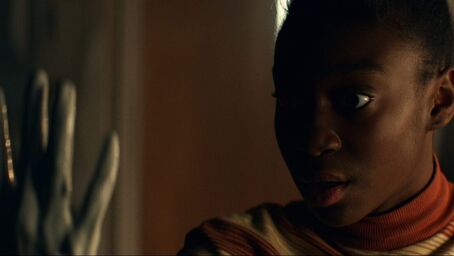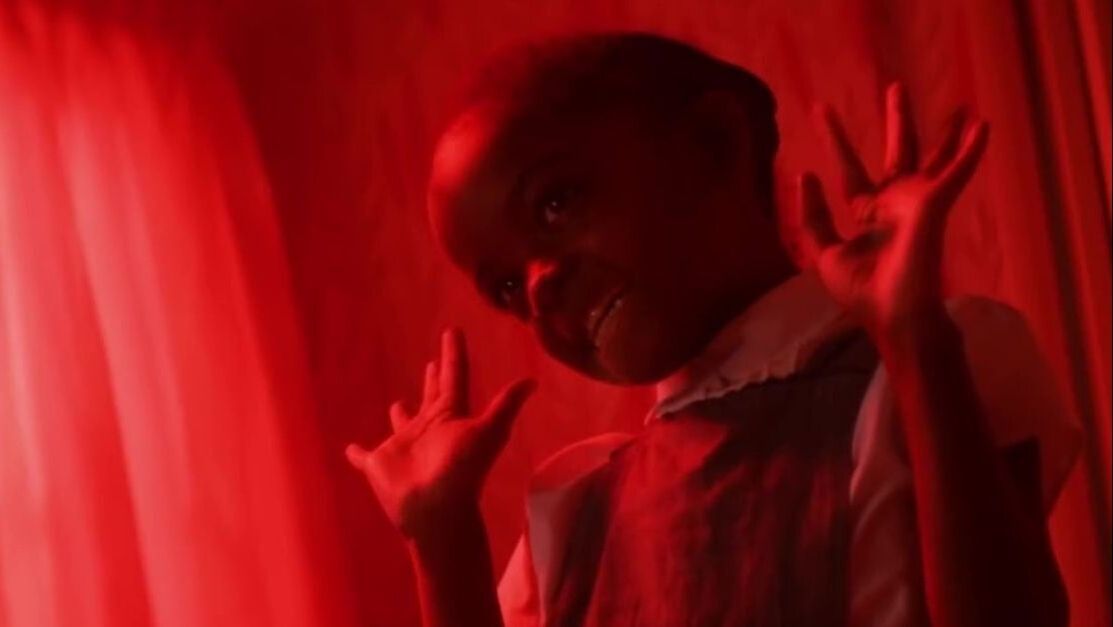 A house is a sanctuary for its inhabitants, a safe place to shut out the world and create a sense of internal happiness and comfort... ...Houses are generally symbols of safety, but each aspect can also represent a specific feeling. Doorways, as points of entry and exit, represent transitions, adopting different faces to better blend with the world around them. Bedrooms, generally spaces of personal refuge, embody comfort and security. Basements, thanks to their darkness and feeling of distance, symbolize unease and uncertainty. Every nook and cranny of a house holds a memory, which could explain why for so long the “American Dream” involved buying a home. If a person owns a house, they can fill it with memories to pass on to the next generation. Without one, however, memories have nowhere to settle and are instead doomed to follow you forever. Houses become haunted because that’s where people store their past. Having premiered this week at SXSW Film Festival, writer-director Little Marvin’s upcoming Amazon series Them brilliantly and painfully demonstrates that when certain groups of people are denied the right to ‘home’, they become haunted, too. Little Marvin’s anthology series (already slated for a second season) will most likely follow the theme of “Them” for each storyline. The first season, titled Covenant, spans ten episodes and shows the terrors both outside and inside the Emory home over a span of ten days. After a disturbing prologue, Them follows the Emory family making their way from North Carolina to East Compton, California. The father Henry (Ashley Thomas) brags up the new location and assures his wife Lucky (Deborah Ayorinde), daughters Ruby (Shahadi Wright Joseph, Us) and Gracie (Melody Hurd), and even the dog that their lives will change only for the better. Textual messages scrawl across the screen to educate the viewers about The Great Migration of African Americans as they left the Jim Crowe south for more promising opportunities elsewhere in the country. With more jobs and houses available, many families like the Emorys relocated. And while the show takes place in 1950s white suburbia, underneath all the pastels and perfectly manicured lawns lurks a terror the Emorys could not expect. Them shows the hardships of a Black family in a white world, but like all period pieces, the series also comments on the present day. Little Marvin expresses his need to create terror by explaining that, while not everyone will encounter a supernatural foe in their life, we all understand the feeling of terror. To best encompass a fear felt by every Black and brown person in the current era, Them needed a villain able to reflect both time periods. So, before the Emorys even have a chance to unpack, the neighborhood wives show up on the front lawn as a form of protest; lead by the incredibly white and blonde Betty (Allison Pills). Armed with radios and iced tea, the housewives get comfortable and prepare to scare away the new neighbors. Betty is a villain we see far too often. She goes by many names: BBQ Betty, Permit Patty, or the all-encompassing Karen. White women who take it upon themselves to regulate the lives of Black and brown people. Betty wants her rules followed and the lack of response by those in authority (Ex: her husband and the police) only enrages her more. Too much time on her hands and too much entitlement fuels Betty; she is the antithesis of Lucky in every way. Lucky stands for education and improving the lives of women, while Betty just barrels through life on a contact-high of power she gets from being in the presence of others. Aside from the fear of their new environment, the Emorys arrive with quite a few ghosts already attached to them. Both parents come to Compton with mental and emotional conflicts, but the internal issues stem from different sources and manifest in different ways. Every day, Henry goes to his job and navigates his life as a Black man in a white world. He shows amazing patience for the ignorance he encounters, which comes as an even bigger surprise when we see parts of his life and past encounters with white people in episode two. Lucky, on the other hand, struggles with the constant bombardment of racism and a loss from her past makes her even more protective of her children. When Henry walks out his front door, he experiences a transition; he must adapt to white spaces. Lucky spends most of her time at home, almost always in the company of at least one of her daughters, so she stays in a Black space, but her home is not impervious to outside forces. Both the adult actors bring such power to the series as we see Henry and Lucky suffer loss, physical and mental pain, and constant fear. Their strength comes from each other and their families, but they still find cracks in each other’s foundations and expose one another to feelings of betrayal. The close-ups, the flashbacks, and the single-tear shots create a powerful depiction of terror, PTSD, and racial injustice, but what I find most unsettling are the possible outcomes for the children. The parents cannot protect Ruby as she goes out into the white world, and her first encounter with her fellow students goes unsurprisingly horribly. But even Gracie, who stays at home, cannot stay protected from the influences of weaponized whiteness. Either late at night or in the terrifying basement with impossibly dark corners, a tall figure appears. The youngest Emory starts speaking with this Miss Vera, an imaginary figure who starts training the small girl to obey her supernatural master and even perform minstrel acts as Grace sings a racially offensive parlor song. Being unaware of the racism Ruby experiences at school is one thing, but the parents cannot even see the supernatural Miss Vera, and therefore remain helpless to protect Gracie. One aspect of racism Marvin tackles is the loudness of it. Not just its volume, but its ability to drown out everyone else. When the husbands gather to discuss their “problem” with the Emorys, one husband refuses to take part and even expresses dissention with the more violent acts of protest. However, his one voice cannot convince the room full of anger and he eventually grudgingly agrees. In Ruby’s classroom, the teacher tries to give her a chance to speak, but the racist behavior of the classmates surpasses any positive action, and she ultimately sides with racism and removes Ruby from the class. One voice or one action might seem a step in the right direction, but a gesture cannot speak louder than ignorance. Saying “I’m not a racist” or “I tried” means nothing when too many other people are shouting the opposite. This review does not begin to explain the impact and the importance of this series. The actors and the director take on a huge endeavor, but everyone does justice to the fictional 1950s story, and real-life as well. Two episodes in of a ten-episode run and so many questions already desperately need answering. Who is Miss Vera? What happens at the end of the 10 days? How far will Betty go to get her way and how far will Lucky go to protect her family? I don’t want to jump too far ahead because I want to take my time getting to know the Emory family and their traumas, but at the same time I cannot wait to see what the focus of the next season will be. And the next. And the next. Them is now playing at SXSW Film Festival and is coming to Amazon. By Amylou Ahava
0 Comments
Leave a Reply. |
Archives
March 2023
|


 RSS Feed
RSS Feed